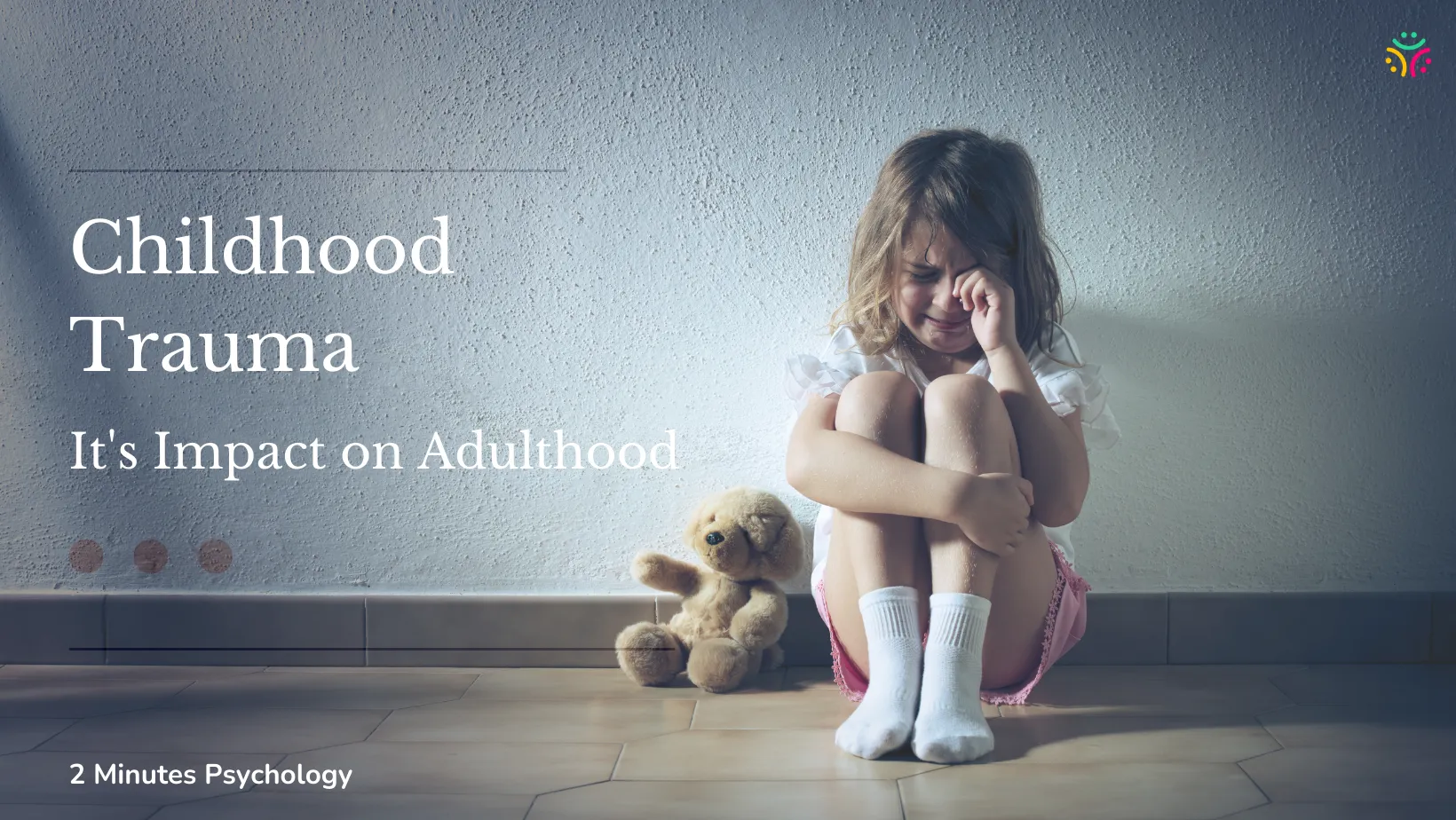
Childhood trauma and it's impact on Adults

2 Minutes Psychology
Sep 10, 2025
Child trauma is a more prevalent issue than commonly perceived. Research indicates that over two-thirds of children have reported experiencing at least one traumatic event by the time they reach the age of 16. Childhood trauma is a complex and far-reaching issue that extends beyond instances of physical, emotional, or sexual abuse. It also encompasses the significant impact of exposure to various traumatic events. Children are vulnerable to the effects of witnessing distressing situations, such as natural disasters that wreak havoc on their surroundings and disrupt their sense of safety. Additionally, they may be exposed to violence within their communities, experiencing the frightening aftermath of conflicts or criminal activities. These incidents can have profound and long-lasting effects on a child's psychological, emotional, and social well-being, shaping their perceptions of the world and influencing their future behaviors and coping mechanisms. Addressing and supporting children who have been exposed to trauma is crucial in promoting their resilience and fostering a healthier path toward recovery and growth.
List of common childhood traumatic events,
which can encompass a wide range of distressing experiences, such as:
1. Psychological, physical, or sexual abuse
2. Exposure to the community or school violence
3. Witnessing or personally experiencing domestic violence
4. Enduring national disasters or acts of terrorism
5. Being subjected to commercial sexual exploitation
6. Coping with the sudden or violent loss of a loved one
7. Dealing with the effects of refugee or war experiences
8. Experiencing stressors related to military families, such as deployment, parental loss, or parental injury
9. Surviving physical or sexual assault
10. Experiencing neglect or abandonment
11. Going through serious accidents or life-threatening illnesses
Facts about Childhood Trauma:
Approximately 1 in 7 children have experienced child abuse and/or neglect in the past year, though this figure is likely underestimated. In 2019, the United States recorded 1,840 child deaths resulting from abuse and neglect. Daily, over 1,000 young individuals seek treatment in emergency departments for injuries related to physical assaults. During the year 2019, nearly 1 in 5 high school students reported being bullied on school premises within the last year.
According to surveys, 8% of high school students had engaged in physical fights on school property one or more times during the 12 months before the study. Every day, approximately 14 young individuals lose their lives due to homicide, and more than 1,300 others receive medical attention in emergency departments for injuries resulting from violent incidents.
Effects of Childhood Trauma:
Childhood trauma can cause lasting effects that extend far beyond childhood. Survivors of childhood trauma may encounter various challenges, such as:
Academic difficulties lead to lower grades and an increased likelihood of facing suspensions and expulsions.
Heightened utilization of health and mental health services due to the emotional impact of trauma.
Greater involvement with the child welfare and juvenile justice systems, as trauma, can influence behavior and coping mechanisms.
Long-term health issues, including conditions like diabetes and heart disease, can be linked to the physiological consequences of prolonged stress.
An increased risk for various behavioral health and substance use disorders, as trauma can serve as a significant contributing factor to these conditions.
Signs of PTSD (Post-Traumatic Stress Disorder) in children:
can vary and may not always be immediately apparent. Some common signs to look out for include:
Intrusive Thoughts or Memories: Children with PTSD may experience recurring, distressing thoughts or memories related to the traumatic event. These thoughts can be intrusive and difficult to control.
Nightmares: Frequent nightmares, especially those related to trauma, are common in children with PTSD.
Avoidance Behavior: Children may actively avoid people, places, or activities that remind them of the traumatic event.
Hyper-arousal: Children with PTSD may display increased irritability, difficulty concentrating, and have an exaggerated startle response. They may also be constantly on edge or easily startled.
Emotional Changes: PTSD can lead to shifts in a child's emotions, such as increased anxiety, sadness, guilt, or anger. They may also have emotional outbursts or display mood swings.
Sleep Disturbances: Children with PTSD may have trouble falling asleep or staying asleep, leading to fatigue and daytime sleepiness.
Physical Symptoms: Some children may complain of physical ailments such as headaches or stomachaches, which may have no clear medical cause but are related to their emotional distress.
Social Withdrawal: Children with PTSD may isolate themselves from friends and family, preferring to be alone.
Regression: Younger children may display regressive behaviors, such as bedwetting or thumb-sucking, that they had outgrown.
Hypervigilance: Children with PTSD may be constantly on guard and overly aware of potential dangers in their environment.
It's essential to note that children may react to trauma differently, and not all children will exhibit the same signs. If you suspect a child may be experiencing PTSD or any other emotional difficulties due to trauma, seeking professional help from a mental health specialist or counselor is recommended. Early intervention and appropriate support can be instrumental in helping children cope and recover from traumatic experiences.
Childhood Trauma in Adults:
Childhood trauma can have lasting effects that may manifest in various ways during adulthood. Signs of childhood trauma in adults can include:
Emotional Dysregulation: Adults who experienced childhood trauma may struggle with managing their emotions. They might have intense mood swings, difficulty controlling anger, or a tendency to become emotionally overwhelmed.
Avoidance Behavior: Adults with a history of childhood trauma may avoid situations, people, or places that trigger memories of the traumatic events. This avoidance can hinder their ability to engage in certain activities or maintain relationships.
Relationship Difficulties: Childhood trauma can impact how adults form and maintain relationships. They may have difficulties trusting others, experience attachment issues, or struggle with intimacy and emotional closeness.
Low Self-Esteem and Self-Worth: Adults who endured childhood trauma may have a negative self-image and struggle with feelings of worthlessness or shame.
Flashbacks and Intrusive Memories: Similar to PTSD symptoms in children, adults with unresolved trauma may experience flashbacks or intrusive memories related to the traumatic events from their past.
Substance Abuse: Some adults may turn to drugs or alcohol as a coping mechanism to numb the pain and distress caused by their childhood trauma.
Depression and Anxiety: Childhood trauma can be a significant risk factor for developing depression and anxiety disorder (Anxiety Disorder Case) in adulthood.
Physical Health Issues: The effects of childhood trauma can extend to physical health problems, such as chronic pain, gastrointestinal issues, or autoimmune disorders.
Self-Destructive Behavior: Adults who experienced childhood trauma might engage in self-destructive behaviors, such as self-harm or risky activities, as a way to cope with their emotional pain.
Dissociation: Some individuals may dissociate from reality as a defense mechanism to detach from traumatic memories and emotions.
Perfectionism: Adults with childhood trauma may develop perfectionistic tendencies as a way to regain control over their lives and surroundings.
It's important to recognize that not all adults who experienced childhood trauma will exhibit these signs, and the manifestation of trauma can vary from person to person. Seeking support from a qualified mental health professional can be beneficial for adults who are struggling with the impact of childhood trauma. Therapy and appropriate interventions can aid in healing, coping, and fostering healthier relationships and life outcomes (Join for a free friendly therapy chat Let's Meet-2 Minutes Psychology).
Childhood trauma counseling near me:
Virtual therapy, also known as online therapy or teletherapy, can be an effective and accessible option for individuals seeking help and support for childhood trauma. It offers several advantages, especially in providing flexible and convenient access to mental health services. Here's how virtual therapy can be beneficial for addressing childhood trauma:
Accessibility: Virtual therapy allows individuals to receive support from the comfort of their homes or any location with internet access. This is particularly helpful for those who may have mobility issues, live in remote areas, or face transportation barriers.
Anonymity and Privacy: For individuals who might feel uncomfortable or self-conscious about attending in-person therapy, virtual sessions provide a sense of anonymity and increased privacy, encouraging open communication.
Flexibility: Online therapy offers flexible scheduling, making it easier for people with busy or fluctuating schedules to fit therapy sessions into their lives
Reduced Stigma: The virtual nature of online therapy can reduce the stigma often associated with seeking mental health support, leading to increased acceptance and accessibility for those in need.
Comfort and Safety: For individuals who have experienced childhood trauma, virtual therapy can create a sense of safety and control, as they can choose a comfortable and familiar environment for their sessions.
Specialized Therapists: Online therapy platforms often connect individuals with therapists who have experience and expertise in treating childhood trauma and related mental health concerns.
Variety of Communication Options: Virtual therapy platforms offer various communication options, such as video calls, phone calls, or messaging, allowing clients to choose the format that suits them best.
Group support for childhood trauma can be an effective and valuable form of therapy, as it offers a supportive and understanding environment where individuals who have experienced similar experiences can come together to share their stories, emotions, and coping strategies. In this, regard 2 Minutes Psychology offers a free virtual chat therapy Let's Meet, where you can get a listener who listens, empathize, and consoles the person. They provide the best support for presenting complaints and issues anonymously.
How to control it?
It is essential to provide reassurance to the child, assuring them that they are safe and secure.
Make sure to explain to the child that they are not responsible for the traumatic events they experienced. Children often tend to blame themselves even when they have no control over what happened. Practice patience during the child's recovery process. Some may recover quickly, while others may take more time. Let them know that there is no need to feel guilty or ashamed about any emotions or thoughts they may be experiencing.
Consider seeking the assistance of a trained professional to help the child and the family cope and move toward recovery. Consult a Therapist If necessary, consult with a mental health expert who specializes in evidence-based trauma treatment. Your pediatrician, family physician, school counselor, or clergy member may be able to provide a suitable referral.
Join Community for Free Virtual Chat Therapy Let's Meet
powered by 2 Minutes Psychology
Community
Share your experience
Let's Meet 2 Minutes Psychology
Aug 28
Remember
Let's Meet 2 Minutes Psychology
Aug 28
Cognitive Behavioral Therapy (CBT) and anxiety coping skills
Let's Meet 2 Minutes Psychology
Aug 28
Anxiety coping skills for teens
Let's Meet 2 Minutes Psychology
Aug 28
Grounding techniques
Let's Meet 2 Minutes Psychology
Aug 28
.png)

